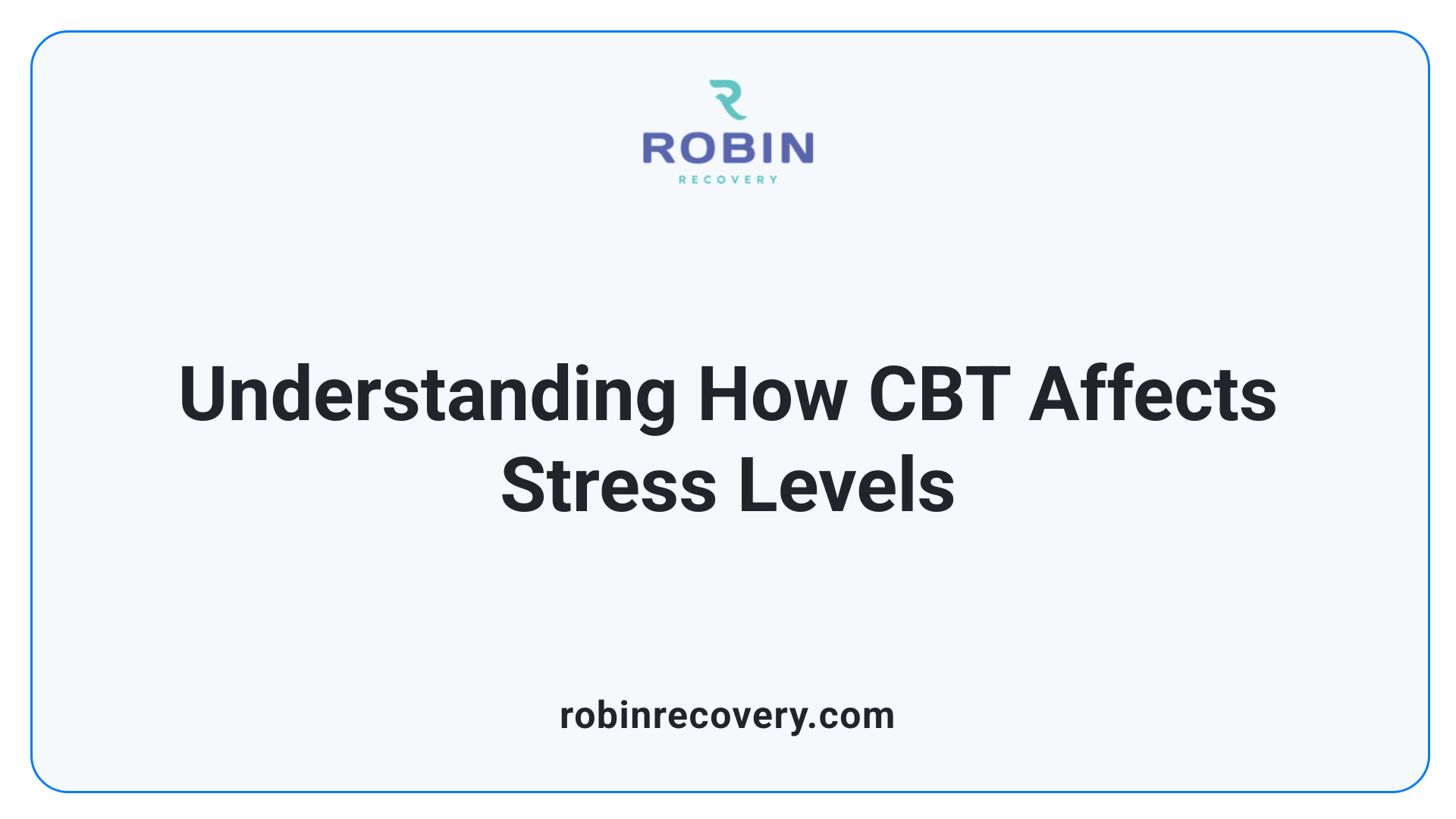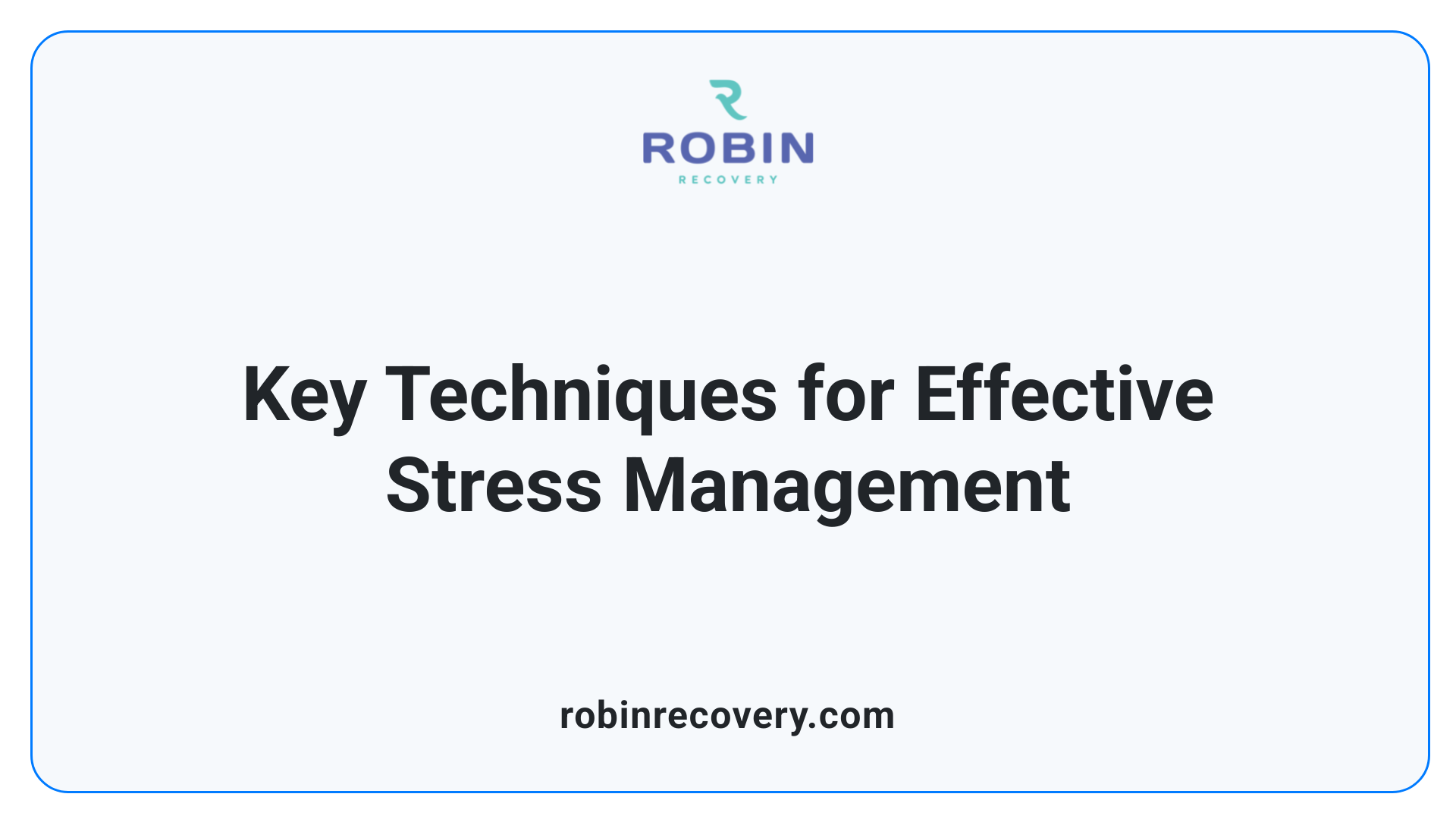How CBT Helps Develop Coping Strategies for Stress

Introduction
In today's fast-paced world, managing stress effectively is crucial for maintaining mental well-being. Cognitive Behavioral Therapy (CBT) has emerged as a powerful tool in developing coping strategies for stress, offering individuals structured methods to reframe their thoughts and improve emotional responses. This article explores how CBT can reduce stress, detailing its techniques, effectiveness, and applications in various contexts.
The Mechanisms of CBT in Reducing Stress

How does CBT help reduce stress?
Cognitive-behavioral therapy (CBT) is designed to mitigate stress by enabling individuals to recognize and alter unhelpful thought patterns and behaviors that contribute to anxiety and overall stress levels. This therapeutic approach has demonstrated significant effectiveness across a spectrum of mental health issues, including anxiety disorders, depression, and PTSD.
CBT incorporates techniques like cognitive restructuring, which involves challenging negative interpretations of events and replacing them with more balanced thoughts. This not only helps reshape emotional responses but also empowers individuals to manage stressors more effectively.
Moreover, CBT promotes self-monitoring, allowing individuals to pinpoint stress triggers and evaluate their responses. Mindfulness practices, deep breathing exercises, and progressive muscle relaxation techniques are integral components, leading to physiological reductions in stress symptoms.
Research supports the efficacy of CBT in reducing cortisol levels, a primary stress hormone, thereby alleviating stress-related conditions. Ultimately, CBT equips individuals with practical coping strategies, such as problem-solving skills and assertiveness training, fostering resilience and facilitating better stress management in their daily lives.
Techniques of CBT for Stress Management

What techniques are used in CBT for developing coping strategies for stress?
Cognitive-behavioral therapy (CBT) employs a diverse array of techniques to aid individuals in creating effective coping strategies for stress. Some fundamental methods include:
- Cognitive Restructuring: This core approach involves identifying and reframing negative thought patterns. By challenging distorted perceptions, individuals can cultivate more balanced and realistic thoughts.
- Behavioral Activation: This method encourages individuals to engage in enjoyable activities, which can help counteract symptoms of depression and anxiety, ultimately enhancing overall mood.
- Relaxation Techniques: Practices like diaphragmatic breathing and progressive muscle relaxation are crucial for alleviating physical tension and reducing feelings of anxiety. These techniques help individuals manage their stress responses effectively.
- Problem-Solving Strategies: CBT emphasizes shifting focus from problems to solutions, which fosters resilience and diminishes feelings of helplessness when faced with stressors.
- Self-Monitoring: Keeping track of thoughts and feelings increases awareness of stress triggers, allowing for better management and coping with symptoms.
- Assertiveness Training: This technique equips individuals with social skills to navigate challenging interpersonal situations, thereby reducing stress associated with social interactions.
- Mindfulness Practices: Integrating mindfulness into CBT helps individuals remain present and aware of their thoughts and feelings without judgment, which can significantly reduce stress and improve emotional regulation.
By utilizing these techniques, CBT empowers individuals to navigate stress more effectively and develop robust coping strategies that enhance their overall well-being.
Evaluating the Effectiveness of CBT in Mental Health

How effective is CBT in improving mental health and reducing stress?
Cognitive-behavioral therapy (CBT) has established itself as a highly effective approach for improving mental health and reducing stress. One of the main strengths of CBT is its focus on changing negative thought patterns and maladaptive behaviors that contribute to an individual’s stress levels. A comprehensive literature review encapsulating data from 1987 to 2021 identified its effectiveness across various mental health disorders, including anxiety, depression, and post-traumatic stress disorder (PTSD).
A Proven Approach
- Physical Health Impact: Beyond mental health, CBT has also shown efficacy in addressing physical conditions tied to psychological stress, such as chronic fatigue syndrome and fibromyalgia. This dual impact underscores its holistic benefits.
- Research Backing: Randomized controlled trials have repeatedly demonstrated significant benefits from CBT, making it a first-line treatment for stress management. Its versatility spans clinical settings and innovative formats, including internet-delivered CBT (I-CBT).
Versatile Formats
- Digital Accessibility: The emergence of self-help platforms like I-CBT has made it accessible for wider populations, enabling individuals to engage in therapy at their convenience. Studies reveal marked reductions in perceived stress, anxiety, and depressive symptoms through I-CBT applications.
- Long-term Efficacy: Continuous research indicates that the applications and positive outcomes of CBT are not only immediate but can be maintained over time, enhancing its role as a foundational strategy for stress management.
In summary, CBT stands out as a well-supported, effective intervention for enhancing mental well-being and mitigating stress, reinforcing its role in personal growth and resilience.
Transforming Thought Patterns: Cognitive Restructuring
Modification of Thought Patterns
Cognitive Behavioral Therapy (CBT) is effective in transforming unhelpful thought patterns that contribute to stress. A core technique known as cognitive restructuring plays a pivotal role in this process. It guides individuals to identify distorted thinking and challenge their negative evaluations of situations.
Common distorted thoughts include tendencies like catastrophizing or viewing situations in black-and-white terms. CBT provides a framework for clients to analyze these thoughts critically, allowing them to replace unrealistic beliefs with balanced, constructive alternatives.
Impact on Stress
The ability to modify these thought patterns has a profound impact on stress management. By fostering a more realistic perspective, individuals can alleviate feelings of anxiety and distress. This therapeutic process not only promotes emotional well-being but also enhances resilience in the face of future stressors.
Ultimately, CBT empowers individuals to view their challenges with clarity, equipping them with practical tools to manage stress effectively.
Can CBT modify unhelpful thought patterns related to stress?
Yes, cognitive behavioral therapy (CBT) can modify unhelpful thought patterns related to stress. One of the primary techniques used in CBT is cognitive restructuring, which helps individuals identify and challenge distorted thinking, such as black-and-white thinking and catastrophizing. This process encourages more balanced and realistic thoughts, which can alleviate stress and improve emotional well-being. Through guided techniques, individuals learn to analyze their thoughts critically and replace negative assumptions with more constructive alternatives. Ultimately, by addressing and reframing unproductive thought patterns, CBT supports stress management and enhances overall mental health outcomes.
Theoretical and Practical Aspects in Stress Management
What are some theoretical and practical aspects of CBT in stress management?
Cognitive Behavioral Therapy (CBT) presents a structured framework to address stress by emphasizing the intricate relationships between thoughts, emotions, and behaviors. Theoretically, CBT serves to identify and challenge cognitive distortions, such as negative automatic thoughts, which often exacerbate feelings of anxiety and depression. By employing techniques like cognitive restructuring and exposure therapy, individuals can learn to reframe their perspectives and develop healthier, adaptive thinking patterns.
Practical implementation of CBT involves various strategies that enhance stress management. Activity Scheduling encourages individuals to engage in enjoyable pursuits, combating feelings of depression. Techniques such as relaxation exercises (like diaphragmatic breathing and progressive muscle relaxation) and journaling are essential for self-monitoring. This self-awareness supports clients in modifying unproductive thought patterns while encouraging the incorporation of positive behaviors into their routines.
Studies have consistently shown that CBT is effective for various psychological conditions, particularly anxiety disorders and depression, reinforcing its relevance as a stress management tool. Furthermore, the adaptability of CBT through online services and self-help programs extends its reach, making effective strategies for managing stress more accessible to diverse populations.
Application of CBT in the Workplace
How is CBT applied to manage stress at work?
Cognitive Behavioral Therapy (CBT) serves as a powerful tool for managing stress in the workplace. By focusing on the psychological aspects of stress, CBT enables individuals to identify and reframe negative thoughts related to their responsibilities and workplace interactions. This reframing can alleviate the emotional burden associated with work-related pressures.
One of the essential techniques in CBT is problem-solving. Employees learn to break down overwhelming tasks into manageable components, which helps them set achievable goals. This not only reduces feelings of being overwhelmed but also enhances productivity and job satisfaction.
Additionally, CBT equips employees with vital communication and assertiveness skills, leading to improved conflict resolution and better relationships with colleagues. Techniques like mindfulness and relaxation exercises can further promote resilience and balance, thereby preventing burnout.
Incorporating CBT into workplace settings can significantly enhance overall employee well-being and satisfaction, creating a healthier work environment that supports personal and professional growth.
Topics Addressed in CBT for Work Stress
Topic Benefits Techniques Used Work Stress Management Reduces feelings of overwhelm and anxiety Problem-solving skills Communication Skills Improves relationships and conflict resolution Assertiveness training Resilience Building Enhances coping mechanisms and prevents burnout Mindfulness practices Workplace Wellbeing Promotes overall satisfaction and productivity Relaxation techniques
Cognitive Coping Strategies for Stress

What are examples of cognitive coping strategies for stress?
Cognitive coping strategies for stress are vital techniques that help individuals manage their thoughts and feelings during stressful situations. Here are some prominent examples:
- Cognitive Restructuring: This technique involves identifying and transforming negative thought patterns into more positive, rational beliefs. By challenging these unhelpful thoughts, individuals can alter their emotional responses.
- Mindfulness Practices: Mindfulness encourages individuals to remain present, which can significantly reduce anxiety. Techniques such as mindful breathing or body scans help maintain focus on the current moment.
- Reframing: This involves changing the way one perceives a stressful situation. By viewing challenges from a different perspective, individuals can lessen the emotional burden associated with stress.
- Guided Imagery: Visualizing calming and peaceful scenes can promote relaxation. This technique can be especially effective in managing acute stress responses.
- Journaling: Writing down thoughts and emotions provides an outlet for expression. This practice allows individuals to process their feelings, leading to clarity and reduced stress.
Stress management
Cognitive Behavioral Therapy (CBT) focuses on the interplay between thoughts, feelings, and behaviors, providing structured strategies for managing stress. Key components include:
- Problem-Solving Techniques: Shifting focus toward finding solutions rather than ruminating on problems can enhance an individual’s sense of control.
- Progressive Muscle Relaxation: This physiologic strategy complements cognitive techniques by teaching individuals to relax their bodies, aiding emotional regulation.
- Activity Scheduling: Incorporating enjoyable activities can counter depressive feelings and foster a positive mindset.
Utilizing these cognitive strategies within CBT not only enhances stress management but also empowers individuals to regain control over their responses to stressors.
Innovations and Accessibility in CBT

Technological Advancements
Recent innovations in technology have significantly transformed the landscape of Cognitive Behavioral Therapy (CBT). Online platforms and mobile applications provide accessible options for individuals seeking therapy, making it easier to incorporate CBT into daily routines. These developments allow clients to engage with CBT principles flexibly, empowering them to practice coping skills anytime and anywhere.
Improving Access to CBT Methods
The rise of telehealth services has further enhanced the accessibility of CBT, breaking geographical barriers that often restrict care. With virtual sessions, therapists can reach a broader audience, including those in remote areas or with mobility challenges. Additionally, self-help materials are available in various formats, such as interactive modules and videos, which cater to diverse learning preferences and needs. This array of options contributes to the wider adoption of CBT as a practical stress management tool.
Conclusion
Cognitive Behavioral Therapy (CBT) offers a comprehensive and effective approach for managing stress, equipping individuals with a varied toolkit to address challenging thoughts and behaviors. The flexibility of CBT techniques—from cognitive restructuring to mindfulness practices—ensures that it can be adapted to suit diverse personal and professional contexts. As technological advances broaden access to CBT, individuals worldwide can more readily integrate these coping strategies into their daily lives, fostering mental health resilience in an ever-changing world.
References
- CBT Coping Skills and Strategies - Verywell Mind
- 5 CBT Coping Strategies to Help with Stress - Naaman Center
- Cognitive Stress Management Therapy | CBT for Stress
- Cognitive-behavioral therapy for management of mental health and ...
- Cognitive-Behavioral Treatments for Anxiety and Stress-Related ...
- Cognitive–behavioral therapy for management of mental health and ...
- CBT Techniques: Tools for Cognitive Behavioral Therapy - Healthline
- How CBT Helps Positively Transform Thinking, Emotions, and Actions
- What is Cognitive Behavioral Therapy?
- Cognitive Behavioral Therapy (CBT): What It Is & Techniques
